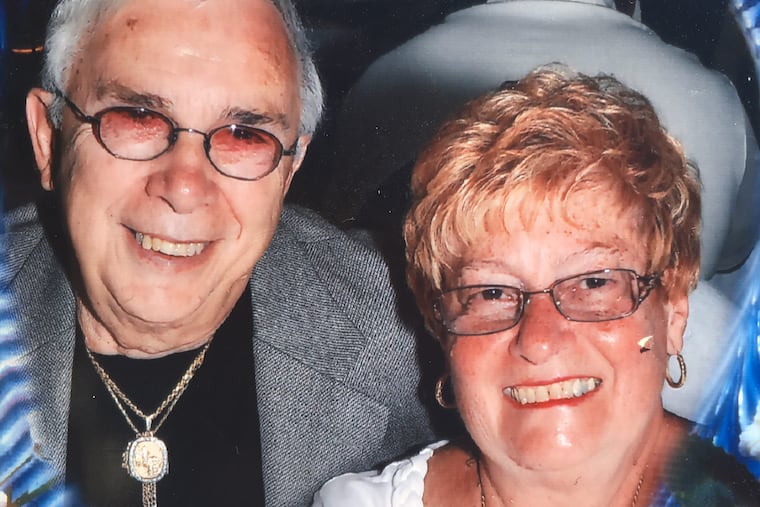Jury convicts man of 1st-degree murder in Christmas Eve 2016 killing of South Philly grocer
Almost three years after 81-year-old Marie Buck was shot dead inside her corner grocery, a city jury convicted Maurice Green, 33, of Overbrook.

It has been nearly three years since 81-year-old Marie Buck was shot dead inside her South Philadelphia corner grocery, a Christmas Eve crime that stunned the city and claimed the life of a neighborhood matriarch.
On Thursday, after deliberating for four hours, a city jury convicted Maurice Green, 33, of first-degree murder and related offenses in Buck’s death. As the jury forewoman read the verdicts, Green, standing with his hands clasped in front of him, showed no reaction. Relatives of the victim wept.
After the jury of 10 women and two men was dismissed, Common Pleas Court Judge Sandy Byrd sentenced Green to the mandatory term of life in prison on the murder charge, and an additional 9½ to 19 years in state prison on gun offenses and a charge of recklessly endangering another person, an 89-year-old woman who was helping Buck in the store that day.
Authorities said Green shot Buck in a botched attempt to settle a drug-related feud with her grandson.
The verdict came after a nearly two-week trial — and more than a year after Green was tried on the same accusations, but jurors in the first trial deadlocked.
Green, of Overbrook, represented himself at trial and told the judge he planned to appeal. “I will maintain my innocence,” he said. He asked the judge to appoint an attorney for his appeal.
Assistant District Attorney Joanne Pescatore told the judge that Christmas is a difficult time for the victim’s relatives, who did not want to speak during the sentencing hearing. Buck had operated her store at Sixth and Titan Streets for more than 40 years, and at 81 years old was still “vibrant,” Pescatore said.
Byrd told the victim’s family that “there is precious little I can say” to offer comfort, noting that Buck was “shot 11 times and died in that corner store, which had become a Philadelphia landmark.”
He called the murder “heinous” and “an ugly offense against anyone who holds life dear.”
After the sentencing hearing, one of Buck’s sons, Robert, 54, said of Green outside the courthouse: “Merry Christmas. He ruined ours, and he can spend the rest of his life in jail.”
Pescatore told reporters that Buck was “a mother, a wife, a grandmother, she was loved by the community,” and that she had “helped people her entire life.“
She noted that Green’s trial was the last for Byrd, who is retiring at the end of the month. “I think you could tell by the look on his face that this case really affected him,” she said, “and it affected everybody that was in the courtroom. It affected the people involved in the case, it affected the police officers, the detectives, and above all it affected the family.”
During the trial, Green sought to poke holes in a prosecution that was based largely on circumstantial evidence.
“He’s trying to install fear,” Green said of Assistant District Attorney Matthew Krouse during a colorful hourlong closing argument Wednesday, saying fear stood for “false evidence appearing real.”
Green also put on some of the clothes that authorities had seized from him after his arrest, bragging about how nice they looked and saying he would not have worn the hoodie that prosecutors had ascribed to the killer. And he accused the District Attorney’s Office of pushing a case he said was like vegetables — missing the seeds of truth.
“We got seeds,” he said. “And the seeds [are] the truth.”
Krouse and Pescatore presented witness testimony, cell phone records, and surveillance video painting Green as an aggrieved drug dealer seeking revenge against Buck’s grandson, Robert.
The grandson and his onetime girlfriend Angela White each testified that months before the shooting, they had conspired to steal a gold chain from Green, their heroin dealer, then pawned the jewelry and used the proceeds to buy more drugs.
Green stewed over the theft of his chain, witnesses said, even as he continued to sell drugs to White.
Prosecutors said cell phone records from the morning of Dec. 24, 2016, showed that Green’s phone was in the area around Marie’s Grocery at the time of the shooting. And at the time Buck was killed, grainy surveillance video from about a block away showed a man parking a car on the street, getting out, and walking in the direction of the store, then returning to the car less than three minutes later and driving away. Several witnesses said the man on the video resembled Green.
Robert Buck said he was supposed to be working in the store that morning but had overslept. His grandmother was shot dead behind the counter around 9 a.m. when a gunman sprayed bullets through the front door.
Green sometimes challenged witnesses about the lack of eyewitnesses or other direct evidence of the crime. At one point, he confronted a detective who had suggested that Green had committed the shooting even though no one had testified that they saw him pull the trigger. The detective apologized for an inarticulate answer, but Green apparently was not satisfied.
“Apology not accepted,” he replied, before continuing his cross-examination.
Krouse, during his closing argument Wednesday, sought to use Green’s occasional outbursts against him, telling jurors that Green would have been angered and ashamed at being “punked” by drug clients who successfully stole his $10,000 chain.
“This was simmering for days, and months, and weeks,” Krouse said.
After Thursday’s sentencing, Buck’s son Robert recalled that his own son was supposed to work at the store that day. Green “was going to kill someone,” he said. “It just happened to be my mother.”